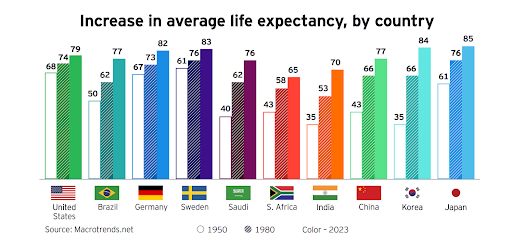MEA alum Marcie Merriman and family friend Zak Dychtwald recently created this “First Global Generation” report, published by Ernst & Young and, wow, is it full of insights. There are some fascinating insights about young adults, but two graphs, in particular, caught my eye.
The first one shows life expectancy growth from 1950 to 1980 to 2023 and it’s very revealing. Whereas other countries have seen their life expectancy grow from 15 to 49 years in the nearly three-quarters of a century, the U.S. has only seen an 11-year growth in life expectancy. Look at South Korea which was half our life expectancy in 1950 and now has 5 years more life expectancy than the U.S. We used to be #1 in the world, but now we’re in the middle of the pack. As I wrote earlier this year when I found out that the U.S. was 48th in the world (out of 195 countries), Longevity is a Litmus Test for a Great Society.
Then, there’s the Optimism/Pessimism index for young adults. While American Millennials and GenZers show about the same mix as other countries when it comes to how healthy and happy young adults will be compared to their parents, we trail the other countries quite a bit (56% vs. 46%) when it comes to the question of whether they’ll be wealthier than their parents. It’s pretty clear that the developing world – Brazil, Saudi Arabia, South Africa, India and China hold more generational financial promise than the more established countries.


In sum, there’s a lot to be learned about young people today as the most recent U-curve of Happiness research shows that the unhappiest adult life stage is no longer people 45-52, but instead it’s people 18-25. This is part of the reason why MEA will be offering a workshop exclusively for Millennials and GenZ in early January in Santa Fe. It might be a perfect time for you to send your adult children to get a taste of MEA’s curriculum of navigating transitions, cultivating purpose, and owning wisdom. The earlier you develop wisdom, the more of your life you have to use it.
-Chip